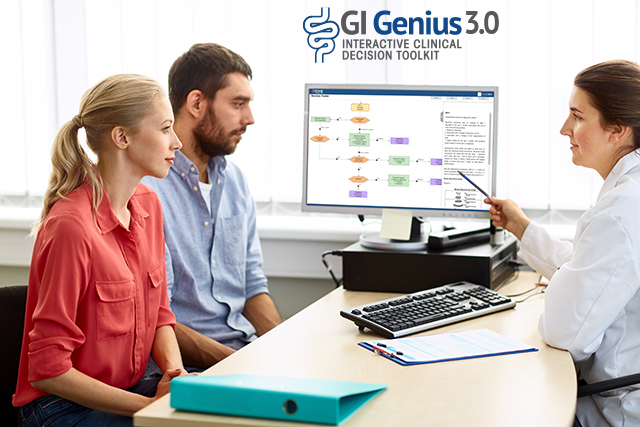
Then click “Request Access” on the website screen and include the temporary registration code found on your special Access Card provided to you by Abbott.
Training Support Videos for Abbott

The Rome Foundation in partnership with LogicNets®, producers of intelligent decision-support automation platforms, have developed the GI Genius Interactive Clinical Decision Toolkit (formally Rome IV Interactive Clinical Decision Toolkit), just released in 2017. This intelligent software system addresses the sophistication and complexity of FGID diagnosis and treatment by providing an online resource to assist practitioners in achieving optimal clinical outcomes. It offers a powerful online and interactive approach for accessing the combination of the Rome IV Diagnostic Algorithms and the Rome IV Multidimensional Clinical Profile for FGIDs (MDCP).

These videos will provide training demonstrations of the GI Genius Toolkit as well as an overview of the new and exciting enhancements made to the toolkit.
At your fingertips, anytime you need it…
- Top-level information on DGBI provided by Rome Foundation Experts
- Intelligent software interactively guides users through diagnostic and treatment pathways
- Excellent resource for training programs
- Multi-platform – smart phone, tablet, or laptop
- Accessible anywhere with an internet connection
- Information is continually updated as new scientific knowledge emerges
Exciting Updates Made in 2020
- Latest updates on approved GI drug treatments
- Improvement in diagnostic pathways
- Improved neuromodulator treatment information
- Pediatric component completed
Watch this video to learn about the GI Genius – an Interactive Clinical Decision Toolkit.
GI Genius Toolkit Demo
Dr. Douglas Drossman discusses the key features of the Toolkit.
Diagnosis Demo GI Genius Pediatric
In this newly released video, Dr. Douglas Drossman discusses the features of this new and exciting diagnostic tool.
A select committee of expert clinicians from The Rome Foundation Board of Directors has worked over the last two years to refine information from the Rome IV Diagnostic Algorithms and the Rome IV Multidimensional Clinical Profile for FGIDs (MDCP) to create an intelligent and flexible software platform capable of being modified as new information accumulates, ensuring that the toolkit provides the most up-to-date compendium of clinical information in one place.
Users will have access to the full range of Rome IV diagnostic algorithms and MDCP treatment guidelines with options to explore, select, and de-select different factors or decision points in any order. Through its logical series of interactive questions, the toolkit will help practitioners in real-time care of their patients shape diagnostic and treatment pathways for optimal outcomes, and revise them later should new symptoms or conditions arise.
While educating its users, this intelligent software program also continues to learn. Practitioners can use the program to log their conclusions, providing important confirmation of the toolkit’s efficacy, or ask for enhanced guidance for providing accurate inputs, which will also help us increase program’s usefulness and accuracy. Should uncertainties in the use of the toolkit arise, that information will be made available to our board of experts who will modify its algorithms to improve its performance.
This innovative program will aid practitioners around the world to successfully access Rome expertise, diagnose and treat patients, increase their own knowledge and credentials, and through interaction with this constantly-learning program contribute to outcomes-based learning.